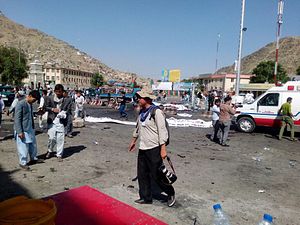In the deadliest attack in Kabul since 2001, at least 80 people–mostly members of the Hazara minority group, a Dari-speaking, Shi’ite community that has long been persecuted in Afghanistan–were killed and more than 230 wounded when two suicide bombers struck a peaceful demonstration in Kabul on July 23.
“We were holding a peaceful demonstration when I heard a bang and then everyone was escaping and yelling,” a protestor told RFE/RL. “I saw many people were killed and most of them were covered with blood. There was nobody to help the victims. Policemen were looking at us and after that I heard gunshots. Then I don’t know what happened.”
Casualties also included bystanders and Afghan National Defense and Security (ANSDF) personnel. According to Afghan officials, one suicide bomber was able to detonate his explosive belt, a second one failed at his detonation, and a purported third bomber was killed by ANSDF members before he could detonate his device.
The regional affiliate of the Islamic State, also known ISIS, has claimed responsibility for the attack. “Two fighters of the Islamic State detonate[d] their explosive belts amid a Shi’ite gathering in the Deh Mazang area in Kabul, Afghanistan,” the terror group’s Amaq News Agency announced this afternoon.
Should ISIS’ claims prove to be true, it would mark the first time that the terror organization has successfully launched an attack of this scope in Kabul. Most recently ISIS and the Taliban have both claimed responsibility for a June 2016 suicide bomber attack in Kabul that killed 14 Nepali security guards. This time, however, the Afghan Taliban immediately denied responsibility for the bombing in a statement issued today:
We wish to make clear that the Mujahideen of Islamic Emirate have no hand in this incident. At the same time we strongly condemn all acts of cynicism which seek to divide the nation into ethnic groups and sides and then pushed into war. Such incidents are carried out by enemies of the nation and is a deplorable step.
The July 23 Hazara protest march, attended by around 10,000 people, was about the minority’s demand to reroute a 500-kilovolt transmission line through the central province of Bamiyan, home to Afghanistan’s largest Hazara community. The protest was triggered by a new Afghan government plan to circumvent Bamiyan and instead run the power line through the Salang Pass north of Kabul to Turkmenistan. This change in route, the government claims, will expedite the project and save millions of dollars in construction cost.
An Afghan government official told AP that authorities tried to dissuade the organizers of the march from holding the protest due to security concerns. “We had intelligence over recent days and it was shared with the demonstration organizers. We shared our concerns because we knew that terrorists wanted to bring sectarianism to our community,” Afghan presidential spokesman Haroon Chakhansuri stated.
Afghan President Aschraf Ghani, in a statement, said that the felt “deeply grieved” by the bombings. “Holding protests is the right of every citizen of Afghanistan and the government puts all efforts to provide security for the protesters, but terrorists entered the protests, and carried out explosions that martyred and wounded a number of citizens including members of security forces.”
Speaking on television later on Saturday, Ghani said: “I promise you I will take revenge against the culprits.” Afghanistan’s Chief Executive Abdullah Abdullah also issued a statement condemning the bombing. “I condemn the attack and pray for those who lost their lives or got injured in the terrorist attack today,” he said on Twitter. “We need to step up and stand united against this and other such horrible atrocities.We must combat our enemies,” he reiterated in a separate note.
“Our condolences go out to those who are affected by today’s attack,” said Resolute Support Commander General John W. Nicholson. “We strongly condemn the actions of Afghanistan’s enemies of peace and remain firmly committed to supporting our Afghan partners and the National Unity Government.”
In the past, the Hazara minority has repeatedly been exposed to attacks by Islamic extremists in the country. Last year, seven Hazaras were kidnapped and beheaded by militants in Zabul province, sparking protests in Kabul. Twin bombings in Mazar-i Sharif and Kabul killed dozens of Hazara in 2011.
July 24 has been declared a national day of mourning in Afghanistan.

































